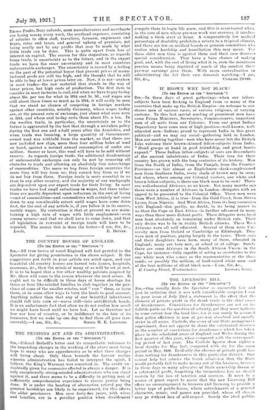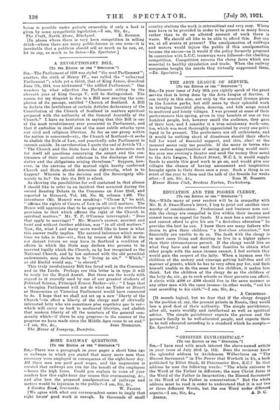TIIE LICENSING BILL.
[To THE EDITOR Or THE "SPECTATOR."] SIR,—OLIO usually finds the Spectator so eminently fair and just in criticism that it was with considerable surprise I saw in your issue of July 23rd a statement to the effect that ths element of private profit in the drink trade is the chief swiss of drunkenness. Convictions for drunkenness are not an in- fallible guide on the question of sobriety, yet they must indicate to some extent how the land lies; for it can surely be assumed that police efficiency is now at pre-war standard and equally strict in all areas. Carlisle, the scene of our State managemest experiment, does not appear to share the substantial decrease in the number of convictions for drunkenness which has taken place in the scheduled areas of England and Wales during the first quarter of this year, when compared with the correspond- ing period of last year. The Carlisle figures show eighteen local drunks for May last, compared with six for the same period in May, 1920. Evidently the absence of private profit has done nothing for drunkenness in this particular district. One cannot help but admire the frank admission that the Stale would probably fail to make money out of the business, because in these days FO many advocates of State ownership dream oi a substantial profit, forgetting the tremendous loss we shoal' sustain by the loss of taxation and revenue. It must be a source of great regret to many that the new Licensing Bill offers no encouragement to brewers and licenseev to provide a better type of public-house, where refreshments of a general character, music, and games are provided, where oll class; may go without loss of self-respect. Surely the ideal public-
house is possible under private ownership if only a lead is given by some sympathetic) legislation.—' am, Sir, &c., The Croft, North Shore, Blackpool. E. Rowsox.
[In places where there is very keen competition in wiling drink—where there are many public-houses in one area—it is Inevitable that a publican should sell as much as he can, or, let us say, as much as he dares.—En. Spectator.]



































 Previous page
Previous page